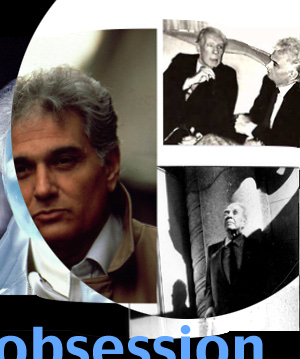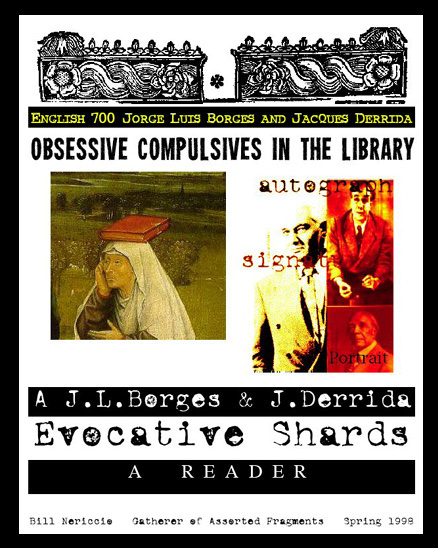REQUIRED TEXTS AVAILABLE AT THE CAMPUS STORE AND, PERHAPS, KB, AND, A LONG SHOT, FTX Jorge Luis Borges Dreamtigers
REQUIRED HARDBACK RECENT TEXTS AVAILABLE EXCLUSIVELY FOR A MODEST, BUT MEANINGFUL, DISCOUNT AT THE BLUE DOOR BOOKSTORE IN HILLCREST. Geoffrey Bennington Jacques Derrida
MENU THURSDAY • JANUARY 28, 1998
THURSDAY • FEBRUARY 5, 1998
Thursday • February 12, 1998
Thursday • February 19, 1998
Thursday • February 26, 1998
Thursday • March 12, 1998
Thursday • March 19, 1998
Thursday • March 26, 1998
Thursday • April 2, 1998
Thursday • April 9, 1998
Thursday • April 16, 1998
Thursday • April 23, 1998
Thursday • April 23, 1998
Thursday • May 7, 1998
Thursday • May 14, 1998
Thursday • May 21 1998
• The Artful Dodge Interview, 1980. A mysterious exchange I pulled off the Internet whose source is now lost to me; I would make some reference to it being appropriate to Borges that the citation is lost if I didn’t suspect you’d see through my shoddy, lazy rationalization. • A selection from Emir Rodriguez Monegal’s striking, out of print biography of Borges. The chapter on ‘Tlön. I think James Woodall is dead wrong about Rodriguez Monegal and hope this chapter convinces you to find his book in a used book store or check it out via the Circuit. • Borges’s “An Autobiographical Essay,” or the foundation for most, if not all, of Woodall’s findings in his biography. Read it carefully and slowly; as much as autobiography, one can find in it a subtle meditation on memory and being. • Introduction to JD: a letter Jacques Derrida wrote to a translator of his in Japan. A clever, serious and witty intro to the eclectic, word-obsessed mind of France’s theoretical guru--the signature is a true facsimile, whatever that means. • An other on-line oddity from http://www.hydra.umn.edu/derrida/jd.html; here is an on-line/eMail conducted exchange between a French journal and the author of Jacques Derrida, Geoffrey Bennington. • From Seven Nights, two short pieces “The Kabbalah” and “Blindness,” the latter key to your reading of the pages from Borges’s Memoirs of the Blind that follow. • Key fragment derived from Jacques Derrida’s recent foray into Art Criticism, Memoirs of the Blind. • From Borges: A Reader several key artifacts culled from Borges’s work: “The Mirror of Ink,” “I, a Jew,” “The Total Library,” “The Aleph,” “Hurry, Hurry,” “From Allegories to Novels,” “Partial Enchantments of the Quixote,” a late story, “Juan Murańa,” a poem, “The Blind Man,” and Borges’s theoretical pivot piece, “Narrative Art and Magic.” Don’t miss the great notes by Alastair Reid and Rodriguez Monegal. • Here it is. In my view, Derrida’s best essay. Certainly one to have under your belt, to recite at night when in the throws of insomnia: “White Mythology: Metaphor in the Text of Philosophy.” • Borges returns. Here in a couple of key stories from Labyrinths: “Emma Zunz” and “The Zahir.” Lovely, evocative and, essentially disturbing tales. • Borges in Spanish. Assorted poems early and late from Selected Poems. • Derrida again. Here we go to town with drugs, or, at least, with the pharmacy. Only this is Plato’s Pharmacy, and our cure may well be the cause of illness as well. A remarkable piece--watch for the Borges cameos. • Borges on Casares. JLB’s prologue to Bioy Casares’s novel The Invention of Morel • Interview city: a collection of revelatory and pleasant exchange between Borges and several interlocutors derived from Twenty-Four Conversations with Borges, Seven Conversations with Jorge Luis Borges & Richard Burgin’s Conversations with J.L. Borges. • Back in the library with Derrida’s latest translated book-length piece, Archive Fever. Brace yourself: this is Derrida at his cleverest. • Borges. Late Borges. A
parting narrative shot from Doctor Brodie’s Report, “The Gospel According
to Mark.”
E 700 W. Nericcio, brewmaster “Your 15 to 20 page essay will comparatively assess some aspect, tendency, idea to be found in the writings of Borges and Derrida. If you wish, I will give you suggested topics, but as I am running this seminar like one I taught in the doctoral degree program at the University of Connecticut, I would prefer you develop your own thesis.” This is what I wrote. It is also approximates what I said. A trip to the pharmacy convinced me that the writing and the saying were less than the same thing, more than the same thing, anything but the same thing. So last class I promised to deliver some specifics, logistics to serve as a balm against anxiety, an anxiety that, funny enough, I share. Once a graduate student, always a graduate student--even when you are a professor. So it is with the hint of some anxiety that I approach the writing of an assignment. In sharing suggestions, examples and proxies of potential essay ideas I want to give you some guidance, but to guide is to supplement and we have read enough Derrida to know that when I get around to supplementing what you might write, I have always already obliterated that which would have spurted out your pen, exploded via photons upon your computer screen. ---To the point, Nericcio. Here it is. Your essays, typed, double-spaced and typed will be handed to me as you walk in the door on Thursday May 14, 1998. This will be our last class, our last discussion, our last chance to seriously play. And play we will. Class, symposium, farewell festival. Your essay will run anywhere from 15 to 20 pages. Possible Essay Topics. 1. Examine and evaluate the proposition that Jorge Luis Borges rewrote books bearing the signature, “Jacques Derrida.” At first glance, the proposition seems absurd, is there anything to this line of interrogation. 2. How do the words of Borges and Derrida rewrite the idea of disciplinary, aesthetic or political boundaries. 3. Write an essay on autobiography and consider how B & D ask their readers to rethink the peculiar conventions of this odd genre. 4. Literature. Philosophy. Literature and philosophy. Literature Against Philosophy. Navigate these churning fragments using the writings of B & D as a rudder. 5. Both Borges and Derrida seem to share a fascinations with the figuration of the Middle East, the cultures and literatures of the Arab World. Rereading the introduction of Edward Said’s Orientalism as a preparation, selectively explore the figuration of Middle Eastern culture in B & D’s writings. 6. Why might it be possible to imagine Borges and Derrida laying bets round a roulette table. Explore the concept of gambling, of stakes, in the work of B & D. That’s it. If you want more, eMail me. I promise not to bark.
|

